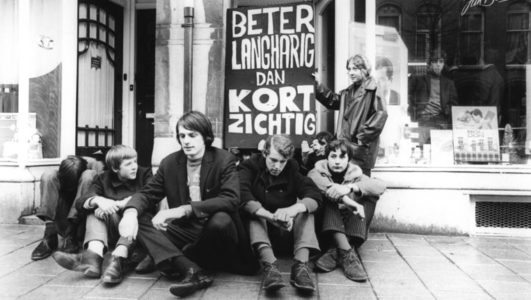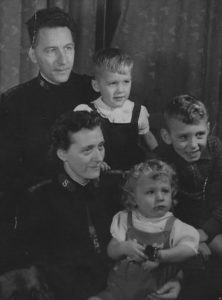
SORT IT OUT YOURSELF
Written by Bert Plomp
In the 1960s, young people worked hard to break free from authority. This particularly applied to the authority of parents, school leadership, the police, and the government. This did not happen without a struggle. That struggle was accompanied by receiving a lot of beatings. If as a young person you resisted the prevailing authority in any way, you could expect a severe beating. Even if you merely questioned something. If you had already received blows elsewhere for such an ‘offense,’ it was better to keep quiet about it at home. Otherwise, you might risk another scolding in your supposed safe haven.
Because I regularly pushed the boundaries of authority from a young age, I had to endure a lot. From kindergarten to the end of high school, my head experienced an avalanche of blows. There were also repeated attempts to rip my ears off. However, without success. Things are quite different nowadays. When police officers have to intervene during violence today, they must act extremely cautiously. They must weigh all pros and cons in a fraction of a second. There is no room for error in their actions. You can be assured that you will be legally prosecuted if you make a mistake. You might even be temporarily or permanently removed from your position. The party against whom you have to act generally weighs next to nothing. However, that party is aware that they can count on the best legal assistance if things go wrong. Also, on the sympathy of the judiciary. Often, a criminal is already walking free on the day of their crime. They frequently get away with a few hours of community service. In the case of a serious offense, they are generally released well within the term of their sentence.
In an armed conflict, soldiers must now also tread carefully. If they do not engage in the fight extremely carefully, they face a similar fate. If, as a teacher, you merely point at a child nowadays, you should expect one of their parents to come by to give you a corrective tap. Even as a doctor, you are not safe anymore when pronouncing a diagnosis. If the result displeases the patient, you run the risk of being beaten up. This also applies mutatis mutandis to ambulance personnel, firefighters, and other first responders. It is truly madness to the extreme. Society would be better off returning to the time of the corrective tap. But a bit milder.
To give an idea of how the overthrow of authority unfolded in my home in the past, let me first outline the composition of the warring parties: the family. When I came into the world, my mother was 33, and my father was 31 years old. My oldest brother Theo was 4 years old at the time. Charles was born 3 years after me. Another 5 years later, my sister Saskia. My parents were a bit late in starting a family. The Second World War and their demanding involvement with The Salvation Army might have contributed to that. As far as I can judge, I haven’t suffered any noticeable deviations from it. Pedagogically speaking, you can hardly argue that my parents raised me. Certainly not by today’s standards. It cannot be said whether they were old-fashioned or modern in that regard: there was simply no upbringing. It was only when I was a teenager that it became possible. Then, with some goodwill, you could say they had become ‘modern.’ But only because they had no other choice. They were forced to keep up with the development of their offspring. The societal changes, in which Charles and I fully participated, they simply couldn’t stop. However much they may have wanted to. Although my parents strongly resisted any change, Charles and I kept pushing our boundaries and, by extension, theirs. Ultimately, my parents gave up their resistance. From that moment on, they looked much more leniently at the developments within their then-still Christian family. Developments that were occasionally stormy.
In essence, my parents’ upbringing amounted to no more than providing shelter and food. In a manner of speaking, they ran a ‘bed and breakfast’ for the children. That wasn’t all. Each child also had the opportunity to go to school. Their goal must have been that simple. They actually thought it was nice enough. In those days, right after the war, many other families were no different. There was no guidance. Not with homework, not with school problems, not with problems involving anyone or anything. You had to figure everything out on your own.
TO BE CONTINUED
For all episodes, click on: The corrective tap
For more free stories, subscribe to my FB page:

